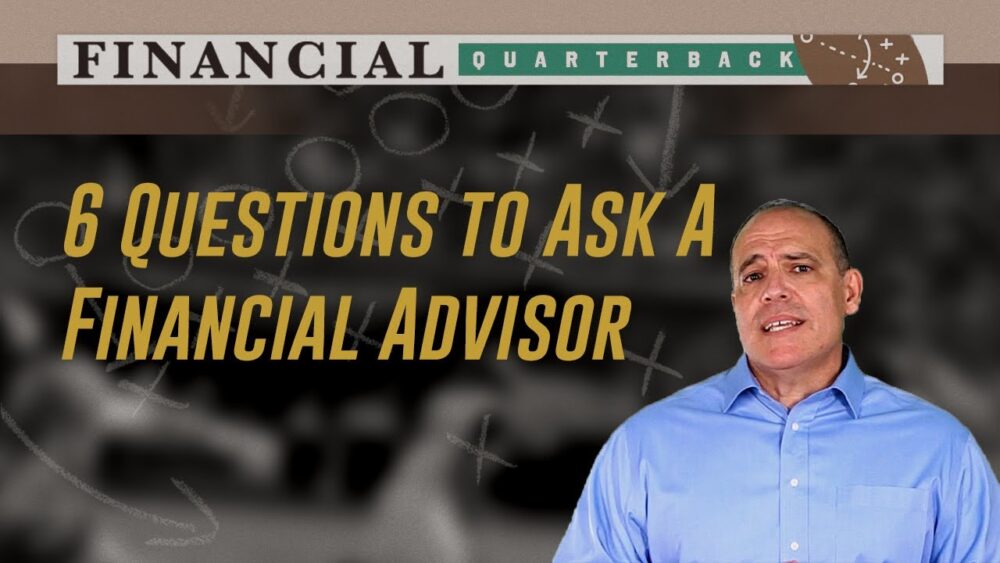Just having a financial planner isn’t enough.
These 6 questions to ask your financial advisor will make sure you find the right person.
Investing and planning for retirement can be stressful and it is OK to look for help.
Knowing how to select a financial advisor can be one of the most important decisions you make and the right financial advisor can be a very valuable relationship.
Not all financial planners are created equal, however—services, compensation, value, and skill levels vary greatly. But you are only going to find out who they are by asking questions. A great advisor will answer each and every one for you.
#1. Will You Act As A Fiduciary…or a Half-iduciary?
Acting as a fiduciary means your advisor must put your interests first, not theirs. (Hey, isn’t that the way it should be?) You’ll be shocked at how many companies are not allowed by law to act as your fiduciary (including some of the biggest names on Wall Street).
If they work for just one company you should AVOID them. Do you want someone managing your money who is locked in to one company’s offerings, or someone with the flexibility to do what is necessary for you, at all times?
You should work with an advisor who can be objective in the investment and strategy selection to meet your goals. A single company advisor is not acceptable in today’s complex and fiduciary world. If your current advisor works for one company, you MUST get a new advisor!
#2. How Do You Get Paid?
IT’S IMPORTANT TO KNOW THAT EVERY ADVISOR GETS PAID!
There are three basic ways a financial advisor can be compensated: a management fee based on a percentage of the assets under management, a commission fee generated from the sale of products, or an hourly consultation fee.
If there is a price to be paid, it must be paid by either the advisor or you.
While fees and compensation are important, it needs to be balanced with the other questions you have already asked, as the advisor’s fee might be well worth the value that he or she brings to your retirement plan. Do not let the compensation overshadow the potential value offered, but make sure you understand the costs associated with the advisor and how these could create potential conflicts of interest.
#3. Are You Listening to Me?
Do they focus on YOU…or their own agenda?
An advisor truly interested and concerned about you will want to get to know and understand you, your situation, and your hopes and dreams before talking about anything else.
You should do most of the talking during your initial meeting with any advisor you are thinking about hiring.
#4. Are You A Certified Financial Planner©?
Education is an important ingredient in selecting a financial advisor.
But don’t be fooled! Many of the designations in this business are worthless and may be acquired simply by writing a check. Any financial advisor committed to the financial planning process will have the designation:
CFP® – Certified Financial Planner
Anyone holding the CFP© mark must pass a rigorous exam, have some years of experience, and obtain continuing professional education. By seeking a planner or advisor with this designation, you can be assured that the planner has made a commitment to obtain sufficient knowledge to excel in financial planning and consulting.
Make sure you ask to see their certificate. Don’t just nod your head in acceptance because they say they have the designation. There have been numerous incidents where the advisor says they are a CFP© and are not, essentially just pretending they are. If you’re embarrassed to ask, you should not be looking for an advisor.
This is YOUR money, so if anyone makes you feel uncomfortable asking to see proof of their certification, then you should get up and walk… FAST.
#5 Do You Provide Comprehensive Planning?
THERE’S A BIG DIFFERENCE BETWEEN A TRUE PLANNER
AND SOMEONE SELLING A PRODUCT
You’ve heard the law of the hammer: if all you have is a hammer, everything looks like a nail!
Buying financial products without a plan is like having surgery without an exam. Call me crazy, but I sure would not want a doctor to operate on me until he knew what was wrong with me. A doctor who performs surgery without an exam would be an idiot!
To the surprise of some people, not all advisors provide comprehensive planning. It is important to know whether or not your advisor provides a full range of retirement planning services in addition to the value and expertise that he/she has already stated that they provide.
Now, a plan may be many things. It can be as short as a single page, a thick set of charts and graphs, or anything in between. One is not necessarily better than the other. It just depends on how detailed your needs are. Even if the written plan is short, the interview process must not be.
A good advisor knows how to get to know you, your goals, and your fears. If you feel he or she truly understands your values, as well as your finances, then you are with the right advisor.
#6. Do You Know Anything About Retirement?
“Mr. and Mrs. Jones, I have to applaud you. You have $500,000 in your IRAs. Congratulations! You’ve done a great job saving for retirement. There’s only one problem. Last year you only made 7% on these IRA’s. We think we can get you 8%. So, I want you to rollover your money to us.”
Sounds familiar? Over the years, I’ve heard this conversation repeatedly and investors falling for it every time.
There are a couple of problems with this type of approach. Primarily, all the emphasis is on rates of return. “You’re getting x. I think I can get you x + 1.” Second, this approach takes no thought for the types of needs a client really has in their long journey through retirement.
WELCOME TO THE LAND OF DISTRIBUTIONS:
WHERE THE RULES ARE ALL DIFFERENT.
Not all advisors and institutions they work for are the same. The more I study retirement, the more I have come to understand that it’s not about assets and it’s not about returns. Now I know this probably goes against everything you have ever heard before, but let me explain.
Sure, it would be nice to have some assets to help along in your retirement. But let’s remember that your assets can be stolen, lost, or divorced. You can even be sued. Your savings could be decimated from poor planning or long-term care expense.
The life blood of your retirement success is based on two things: your sources of guaranteed income and whether you have taken all the key risks off the table.
Proper planning for a successful retirement encompasses many things: How to best leverage social security and pension into your plan, how to structure your portfolio for reliable income, proper market exposure, how to minimize taxes from those IRA’s and 401k’s, what happens to income if spouse dies, long-term care planning, estate planning, and a host of other issues that occur along the way.
LET ME CLARIFY: STOCKS, TRADING, MARKET TIMING, AND LISTENING TO SUPPOSED MARKET EXPERTS IS SEXY BUT IT HAS LITTLE IMPORTANCE IN YOUR LONG RETIREMENT JOURNEY
OK! That’s a pretty good round of tough questions to ask, don’t you think?
We know that these are sometimes hard questions to ask, because you may feel you are going to be insulting the person.
DON’T HESITATE TO ASK THESE QUESTIONS, EVEN IF IT FEELS UNCOMFORTABLE!
We are talking about YOUR MONEY here!
Being shy has no place in the process. If you feel too embarrassed to ask the questions yourself, have a trusted friend or relative ask them for you.
Whatever way you get this quizzing done, just be sure to GET THE QUESTIONS ASKED AND ANSWERED!
And, if your current advisor is not holding up under the questions…GET RID OF THEM! Don’t stick with somebody just because you “like them” or because they are your brother-in-law, or because you’ve been with them for a million years. If they are not working in your best interests, dump them now.
If you decide to stick with them despite knowing what you now know…then you’re on your own.



